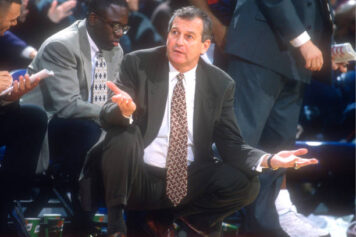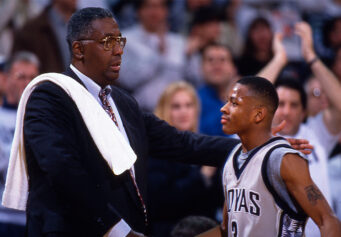No. 9 Florida State eliminated No. 1 seed Xavier in Nashville on Sunday night after overcoming a 12-point deficit in their 75-70 win. They advanced on to the Sweet 16 where they’ll face No. 4 seed Gonzaga.
It was a great win for the Seminoles, but even more important in highlighting the declining racial diversity on the college basketball sidelines.

College Basketball Narratives- Leonard Hamilton
Of the 68 teams that gained entry into this year’s NCAA Tournament, excluding HBCU’s Texas Southern and North Carolina Central, only 14 had African-American head coaches – Alabama’s Avery Johnson, Providence’s Ed Cooley, Butler’s Lavall Jordan, North Carolina State’s Kevin Keatts, Montana’s Travis Decuire, Missouri’s Cuonzo Martin, the College of Charleston’s Earl Grant, Cal State Fullerton’s Dedrique Taylor, Arkansas’ Mike Anderson, Bucknell’s Nathan Davis, Texas’ Shaka Smart, Radford’s Mike Jones, Georgia State’s Ron Hunter and Florida State’s Leonard Hamilton.
In 2005, a third of major-conference teams were coached by a person of color. Last year, that number was a mere 17 percent, the lowest since 1995. And yet, close to 75 percent of power conference rosters are non-white.
A disturbing 90 percent of the nation’s athletic directors are white, and as the years progress, they seem less inclined to consider non-white candidates.
In the early 1990’s, we had a group of prominent Black coaches like Minnesota’s Clem Haskins, Georgetown’s John Thompson and Arkansas’ Nolan Richardson who we thought had finally kicked down the antiquated notions and hiring practices at major D-I institutions.
1994 National Championship – Arkansas vs Duke
NCAA Vault – Relive history by team, year, game or moment using the new interactive play-by-play timeline – http://goo.gl/u8xnKG – In front of 23,674 screaming fans, Arkansas and Duke square off in a dramatic final matchup. After trailing at halftime, Duke came out early in the second half to take a 10 point lead.
In the late ’90s, a look at the Big 10 showed significant inroads with Brian Ellerbe, Mike Davis, Jerry Dunn and Randy Ayers on the sidelines at Michigan, Indiana, Penn State and Ohio State respectively. But it was just a mirage, as things spiraled downward from there.
Sadly, at this time of year, while most college basketball fans are ripping up their brackets, and alums of teams that have advanced to the Sweet 16 are celebrating, Black coaches are often left asking themselves the same questions.
When one gets fired, it’s extremely rare for another one to take his place. And for those unfortunate ones who get pink slips, they know that it’s highly improbable that they’ll get a decent second chance at a prominent gig.
One of the coaches who has been holding it down over the years is Florida Sate’s Leonard Hamilton, who happens to be the last Black man standing in this year’s Sweet 16.
After his squad knocked off the No. 1 seed Xavier, Hamilton said, “I think what you see happening in college basketball, it’s almost like a revolution. What happens is, you start categorizing people by the reputation that their players get going into college. But in reality, kids are playing basketball all over the country and teams are getting better. Just because maybe they might not be in one particular conference or maybe they’re not considered to be one of the more traditional rich schools, people are playing basketball.”
Two years ago, I was able to spend some time with Hamilton at the Final Four in Houston. If you don’t know much about the man other the the job he holds, you should get to know him and understand where he comes from.
Game Rewind: Watch Florida State’s stunning upset over Xavier in 8 minutes
Florida State takes down No. 1 seed Xavier in the Second Round! Watch how the Seminoles advanced to the Sweet 16 in 8 minutes. Watch highlights, game recaps, and much more from the 2018 NCAA Division I Men’s Basketball Tournament on the official NCAA March Madness YouTube channel.
He grew up on the rough side of a basketball town, Gastonia, North Carolina to be exact, in a house with no indoor plumbing. His family had to boil water on the stove in order to get a hot bath going. The neighborhood that shaped his initial worldview was known as “The Gas House.” That was because of stupefying rates of crime and violence, and the inordinate amount of residents who wound up on Death Row.
His father didn’t get past the eighth grade and his mother was forced to drop out in the seventh to work as a sharecropper. Segregation ruled his childhood. And though many think those days were a long time ago, Hamilton grew up under the grip of Jim Crow.
Through athletics, though, he found a path toward a college education. His father constantly preached the value and spoke of the transformative magic of education. When the household of eight became too chaotic for him to study at night, Hamilton could be found reading with a flashlight nearby in a broken-down car.
“My father never allowed me to make excuses,” Hamilton said. “He wouldn’t allow us to complain about other people enjoying certain advantages. His motto was pretty simple, just get the job done.”
Had he come of age today, he could have gone to any number of top college programs nearby to play basketball. But the big time programs in the South back then were not in the business of giving many athletic scholarships to young Black men.
After two years at Gaston College, Hamilton became the first black basketball player ever at the University of Tennessee-Martin. He later earned a Master’s Degree from Austin Peay. His example inspired his siblings to chase their own higher education dreams.
Florida State vs. Missouri: Seminoles pull away to advance in the NCAA Tournament
Watch the Game Highlights from Missouri Tigers vs. Florida State Seminoles Watch highlights, game recaps, and much more from the 2018 NCAA Division I Men’s Basketball Tournament on the official NCAA March Madness YouTube channel.
While completing his Master’s, he adopted his younger brother Willie, who went on to graduate from Western Carolina. He later adopted his younger siblings Barry and Pamela as well.
When Leonard was a kid, the options for Blacks in Gastonia were limited: either working in the cotton mills and joining the army. He singlehandedly changed that entire paradigm for his brothers and sisters with his passion for education and the power of his own example.
New York City playground legend Fly Williams was his first recruit when he went into coaching as an assistant at Austin Peay. He went to three Final Fours as an assistant coach at the University of Kentucky from 1974 to 1986 while winning the National Championship in 1978. He is the first to ever be named the Coach of the Year in both the ACC and The Big East. He’s taken both the University of Miami and Florida State to the Sweet Sixteen and he’s been a two-time National Coach of the Year.
Yet none of that captures the essence of a man who was once one of the first black college athletes in the south, a man who came from oppressive poverty who could not eat in certain restaurants, who had to sit in the negro balcony at certain movie theaters, who was called a N***** quite often in the days of America’s shameful past.
With the resurgence of hate and America’s glaring inequities that still persist today, Hamilton embodies much more than meets the eye.
Leonard Hamilton Era
Leonard Hamilton Era as the Head Coach at Florida State University
He’s a bridge to the past, hopefully connecting to the future where rising young African-American coaches are given opportunities that are long overdue.
The NCAA and its member institutions have plenty of work to do when it comes to diversity on the sidelines. In the meantime, Hamilton will continue to hold the flame aloft for those coaches who are prepared and qualified, but still have to fight through hiring practices weighted heavily against them in order to prove that they belong.



